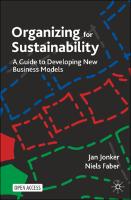Organizing for Sustainability
A Guide to Developing New Business Models
Author(s)
Jonker, Jan
Faber, Niels
Language
EnglishAbstract
This upper-level Open Access textbook aims to educate students and professionals on how to develop business models that have a positive impact on people, society, and the social and ecological environment. It explores a different view of how to organize value creation, from a focus on an almost exclusively monetary value creation to one that creates positive impact through multiple values. The book offers students and entrepreneurs a structured approach based through the Business Model Template (BMT). It consists of three stages and ten building blocks to facilitate the development of a business model. Users, be they students or practitioners, need to choose from one of the three offered business model archetypes, namely the platform, community, or circular business models. Each archetype offers a dedicated logic for vale creation. The book can be used to develop a business model from scratch (turning an idea into a working prototype) or to transform an existing business model into one of the three archetypes. Throughout the book extra sources, links to relevant online video clips, assignments and literature are offered to facilitate the development process. This book will be of interest to students studying the development of business models, sustainable management, innovation, and value creation. It will also be of interest executives, and professionals such as consultants or social entrepreneurs seeking further education.
Keywords
sustainability; business modelling; value creation; circular business model; circular economy; business model template; circular; TextbookDOI
10.1007/978-3-030-78157-6ISBN
9783030781576, 9783030781576Publisher
Springer NaturePublisher website
https://www.springernature.com/gp/products/booksPublication date and place
2021Imprint
Palgrave MacmillanClassification
Business and the environment; ‘green’ approaches to business
Business strategy
Business ethics and social responsibility


 Download
Download Web Shop
Web Shop